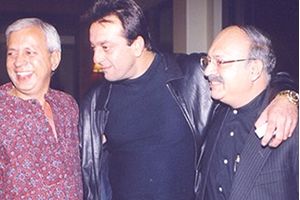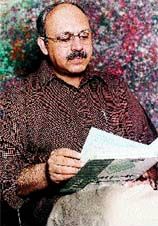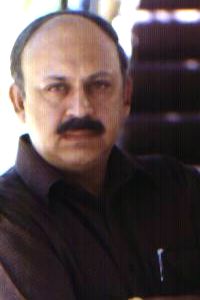He may be a familiar face as an actor, but Akash Khurana is a multi-faceted personality.
He has a doctorate from the Tata Institute for Social Sciences under his belt, and divides his time teaching Organizational Behaviour and Business Environment at TISS and shouldering responsibilities as the chief creative officer at Nimbus Communications.
His foray into the field of scriptwriting was quite accidental. It was while working on a Mahesh Bhatt film, Swayam, that he chipped in when the script was being reworked. There has been no looking back since. After writing the scripts for feature films like Aashiqui, Baazigar and Daag -The Fire, he ventured into TV territory with Kuch Ret Kuch Pani, a soap that aired on Channel Nine Gold. While he wrote and directed Kuch Ret Kuch Pani himself, he also wrote Plus Channel's Kabhie Kabhie, directed by Mahesh Bhatt.
If his other virtues appear rather disparate from his writing avatar, they also add in making him a more thinking and intellectual writer. Excerpts of an interview with indiantelevision.com correspondent,Amar.
How did your writing career take off?
I was acting in a movie called Swayam with Waheeda Rehman in 1988. This was a small budget movie that had to be wrapped up in an intense 18-day schedule. However, the script had some lacunae and we had to re-work it while shooting. I re-worked the script along with Mahesh Bhatt and both of us shared the writing credits. That's how my writing career started. I later wrote the hit movies - Aashiqui andBaazigar, besides writing a lot of TV software.
What do you think is essentially required of an effective writer?
Your instinct, by itself is the most necessary factor. Besides, understanding the craft of TV and film writing, experiences, sensitivity to different situations, empathy towards unknown characters are some of the instincts required of an effective writer.
Which subjects appeal most to you?
As far as commissioned programmes go, one really doesn't have much choice as far as subjects are concerned. In fact, I have learnt to operate in a way that I'm fairly comfortable working on disparate subjects.
What is the starting point of your writing - an idea, a concept, the complete story?
It could be anything- a thought, a conversation, an incident from real life or it could be autobiographical stuff.
|
"India is perhaps the only country where we have such a sharp distinction between screenplay and dialogues"
__________ |
 |
Do you agree with the adage that TV is a writer's medium?
I agree with it. The effort required in writing five episodes is equivalent to the effort required in writing one movie. Besides, TV has its limitations. Because it can't be shot with the lavishness with which a movie is shot, the dependence on dialogues is that much more. So, writing really is the most crucial aspect in making a serial tick.
Why is TV so verbose? Is it because of budgetary constraints that are a hindrance to expensive outdoor shoots?
More than the budgetary factor, I believe it's because the audience is too impatient to stay glued to a programme when there is a gap between dialogues. On TV, more than the visuals it is the dialogues that hold the audience rapt and the moment there is a gap between dialogues they tend to move to another channel.
How important is effective narration in selling a story?
It is indispensable. In India, the concept of a bound script is non-existent. At the same time, people lack the practice of extensively reading the scripts. In this situation, effective narration is what matters most.
 |
"While a bad piece of work draws flak very easily, writers seldom get due recognition for good work. " |
Mir Muneer has said that story telling is virtually non-existent today and serials are simply a conglomeration of some very dramatic scenes. Do you feel the same?
I wouldn't agree with him entirely. There are some serials that have very good stories while others don't. So, it's really a matter of personal opinion.
You have been quoted as saying that there is no sincerity and passion in TV writing, and no absorbing screenplays nowadays. Could you elaborate?
Actually, I had said that these factors have diminished today. And it is quite obvious too. From less than 100 hours of entertainment programming in 1985, today we have some 5000 hours of entertainment programming. Obviously the ratio of skilled writers has not grown in the same proportion, hence the diminishing sincerity and passion seen in TV writing and the resultant lack of absorbing screenplays. But having said that, let me also add that I have a lot of admiration and respect for people who have sustained themselves and consistently done well as TV writers. I personally have found TV to be an extremely taxing medium where I reached a burn out situation rather quickly.
Why do most veteran writers shy away from writing dialogues?
Because they are not qualified. Their level of knowledge and usage of Hindi is rather pathetic. India is perhaps the only country where we have such a sharp distinction between screenplay and dialogues.
Does TV writing pay well?
This is a difficult question. Let's say it does pay better than what a well educated and qualified person would earn in a regular job. But if we speak in relative terms, yes, it should pay more considering that TV is acknowledged as a writer's medium. But, frankly, writing is one of the most unenviable professions. While a bad piece of work draws flak very easily, writers seldom get due recognition for good work.
|
"My generation of writers is far more literate and well read than the generation that is coming up and there can be no substitute to reading."
__________ |
 |
What is your writing schedule like?
It's pretty erratic and that is because I am into so many activities - writing, teaching and then I have a whole lot of responsibilities to shoulder as the Chief Creative Officer at Nimbus. So, I really can't plan a definite writing schedule.
Do you find channels' interference in the creative process overbearing?
No, certainly not. Channels are more concerned about their product nowadays than they ever were. This has made them more collaborative and involved. But yes, I do feel that the time taken by them to respond on any issue is far too long. If they can improve on this front, it would help do away with a lot of the producer's uncertainties.
Does writing require isolation from people in order to concentrate?
Ideally, yes. But it is seldom completely possible. I have seen people writing on the sets also. It's not that one cannot write when not alone, but isolation is certainly preferred.
What according to you are the major failings in new writers?
Well, my generation of writers is far more literate and well read than the generation that is coming up and there can be no substitute to reading. But then I also feel that the new generation has grown up watching soaps and thus is that much better versed in its writing unlike my generation which hardly had an access to the electronic medium. But all said, I do feel that the new writers who are just coming up should be better read.
Which has been the happiest moment of your career?
My taking to writing was a happy moment. That I'm still writing today makes another happy moment (laughs). Actually, cracking a difficult scene makes an immensely happy moment. The feeling is akin to one of having struck a cover drive from the meat of the bat.






